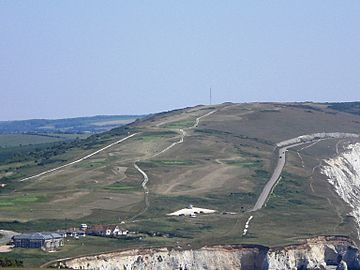Afton Down facts for kids
Quick facts for kids Afton Down |
|
|---|---|

Afton Down viewed from Tennyson Down.
|
|
| Geography | |
| Location | Isle of Wight, England |
| Topo map | OS Landranger 196 |
Afton Down is a beautiful chalk hill located on the Isle of Wight in England. It's near the village of Freshwater and faces the stunning Compton Bay to the west. This area is known for its natural beauty and interesting history.
Contents
Afton Down Music Festival
Afton Down was the famous location of the Isle of Wight Festival 1970. This huge music event attracted an incredible number of people. The Guinness Book of Records estimates that between 600,000 and 800,000 fans came to see their favorite bands.
Legendary Performers
Many legendary musicians played at the 1970 festival. Some of the most famous acts included:
- Emerson, Lake & Palmer
- Free
- The Who
- The Doors
- Ten Years After
- Taste (Irish band)
- Jimi Hendrix
This festival was one of the biggest music events of its time.
Nature and Wildlife
Afton Down is home to many tough plants that can handle the windy conditions. These plants are similar to those found in nearby Compton Bay.
Plants of Afton Down
Large European gorse bushes grow on the cliffs. These bushes offer shelter to other plants, helping them to grow. You can find plants like wild cabbage and bird's foot trefoil thriving here. Because of the strong winds from the English Channel, no large trees can grow on the down. This allows shrubs and grasses to flourish.
Rare Flowers and Butterflies
The pyramidal orchid, which is the Isle of Wight's county flower, also grows on Afton Down. Another important plant found here is Plantago lanceolata. This plant is the main food source for the rare Glanville fritillary butterfly. It's a special place for these unique species.
Exploring Afton Down
There's a car park near the highest point of the Military Road that crosses Afton Down. From here, visitors can walk downhill on a footpath towards Freshwater Bay. It's a great spot for a scenic walk.
The Miller Obelisk
Near the cliff edge on Afton Down, you'll find an obelisk. This tall stone monument is a memorial to Edward Lewis Miller. He was a 15-year-old boy from Goudhurst in Kent who sadly died after falling from the cliff in 1846. The obelisk was made a Grade II listed building in 1994, meaning it's an important historical structure.
The obelisk has a special message carved into it:
E.L.M. Aged 15
He cometh forth like a flower and is cut down.
He fleeth also as a shadow and continueth not.
Erected in remembrance of a most dear and only child who was suddenly removed into eternity by a fall from the adjacent cliff on the rocks below.
28th August 1846.
Each side of the obelisk also has Bible verses about the afterlife.

Past Traditions
In the 1600s, local people used to climb down the cliffs of Afton Down. They would collect seabirds and pick a plant called samphire. The bird feathers were sold, and the bird bodies were used by fishermen to bait crab pots. The samphire was pickled and sent to London in barrels.
Golf Course
The Freshwater Bay Golf Course is also located on Afton Down. It offers a unique place to play golf with amazing views.
Ancient History
Afton Down is home to a group of 24 ancient burial mounds called barrows. These barrows include:
- One long barrow (34.7 meters long, 0.9 meters high, running east-west)
- 17 bowl barrows
- 4 bell barrows
- 2 disc barrows (one of which is on the golf course)
Bronze Age Discoveries
One of these barrows has been studied by archaeologists. They believe it dates back to the Bronze Age. In 1817, an excavation took place. While the long barrow didn't reveal much, several cremated remains were found in the round barrows. These discoveries help us learn about the people who lived here thousands of years ago.
 | Aaron Henry |
 | T. R. M. Howard |
 | Jesse Jackson |

